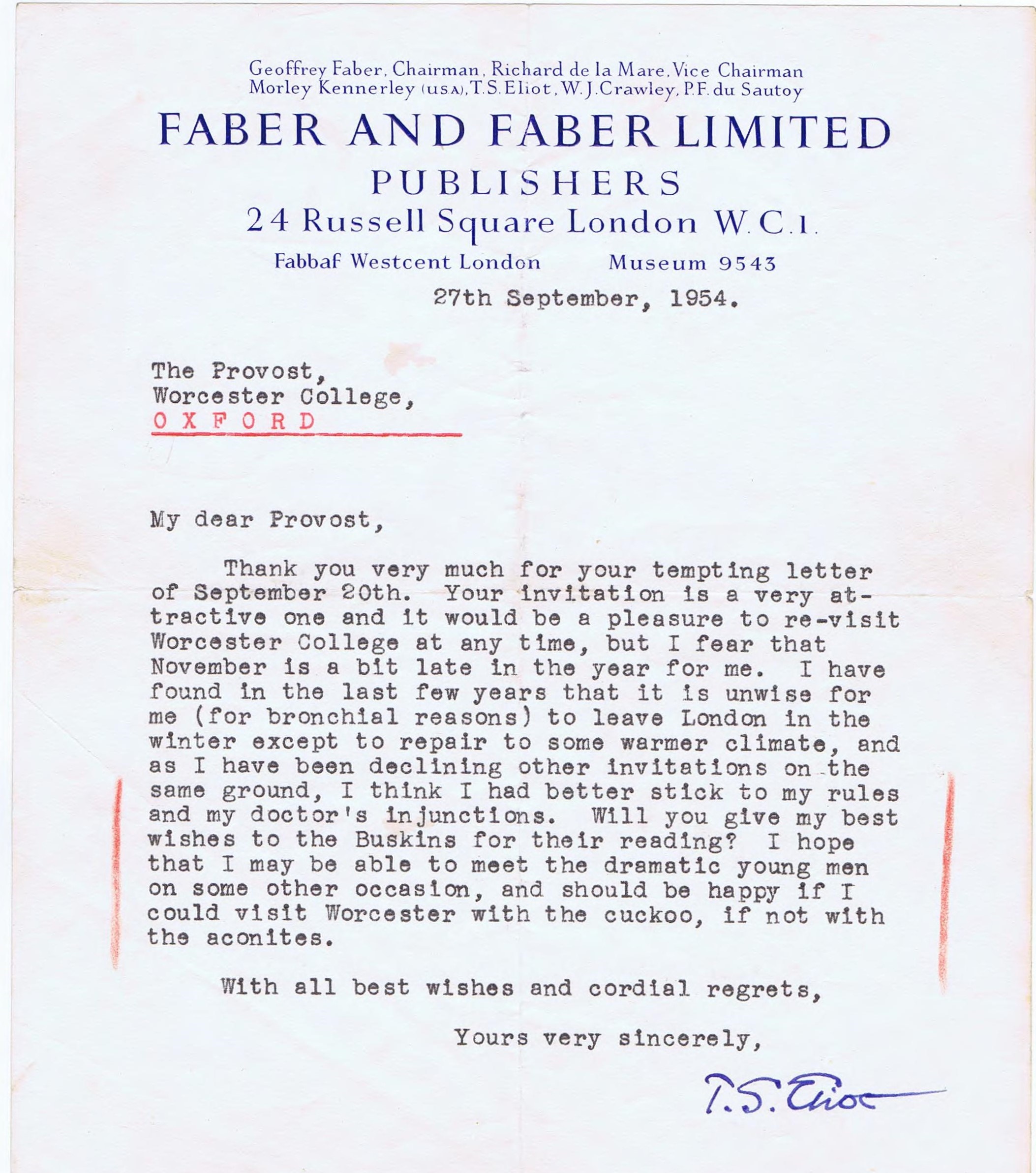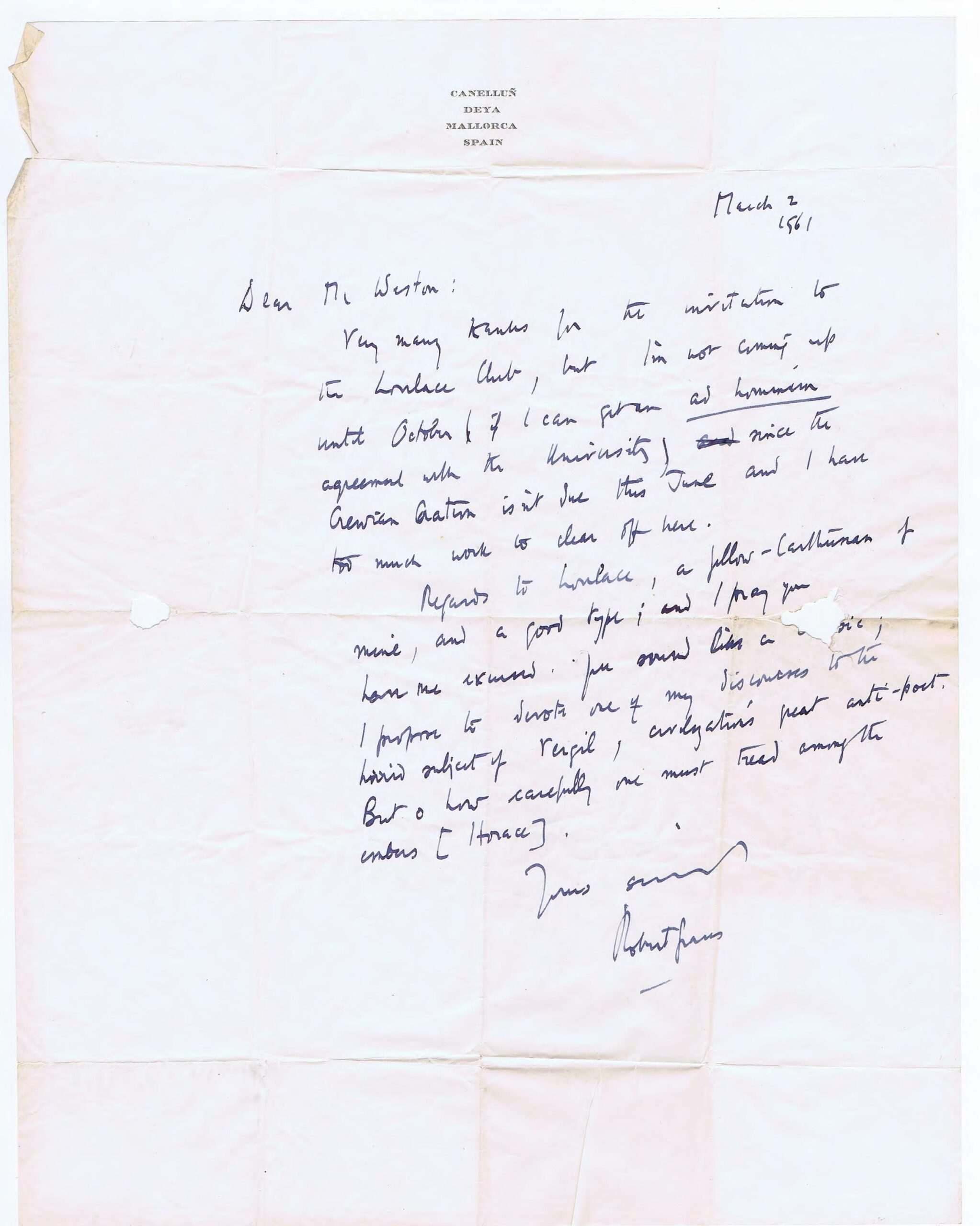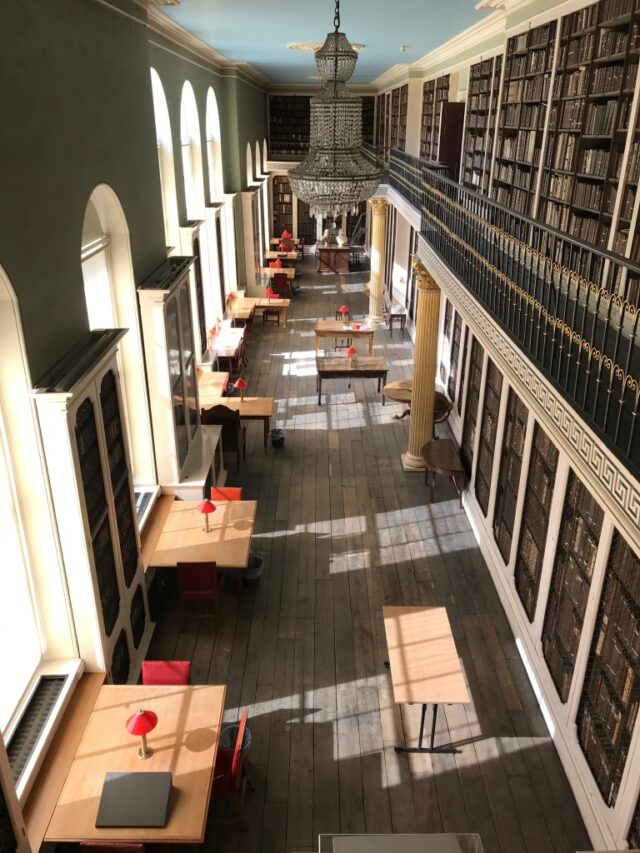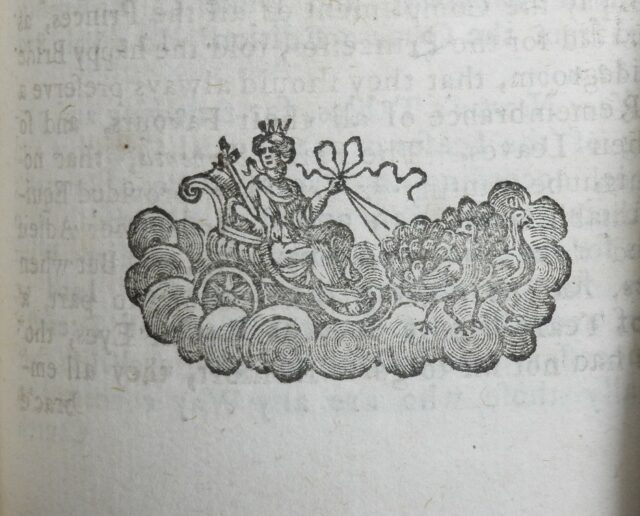‘With all best wishes and cordial regrets…’: turning down social invitations
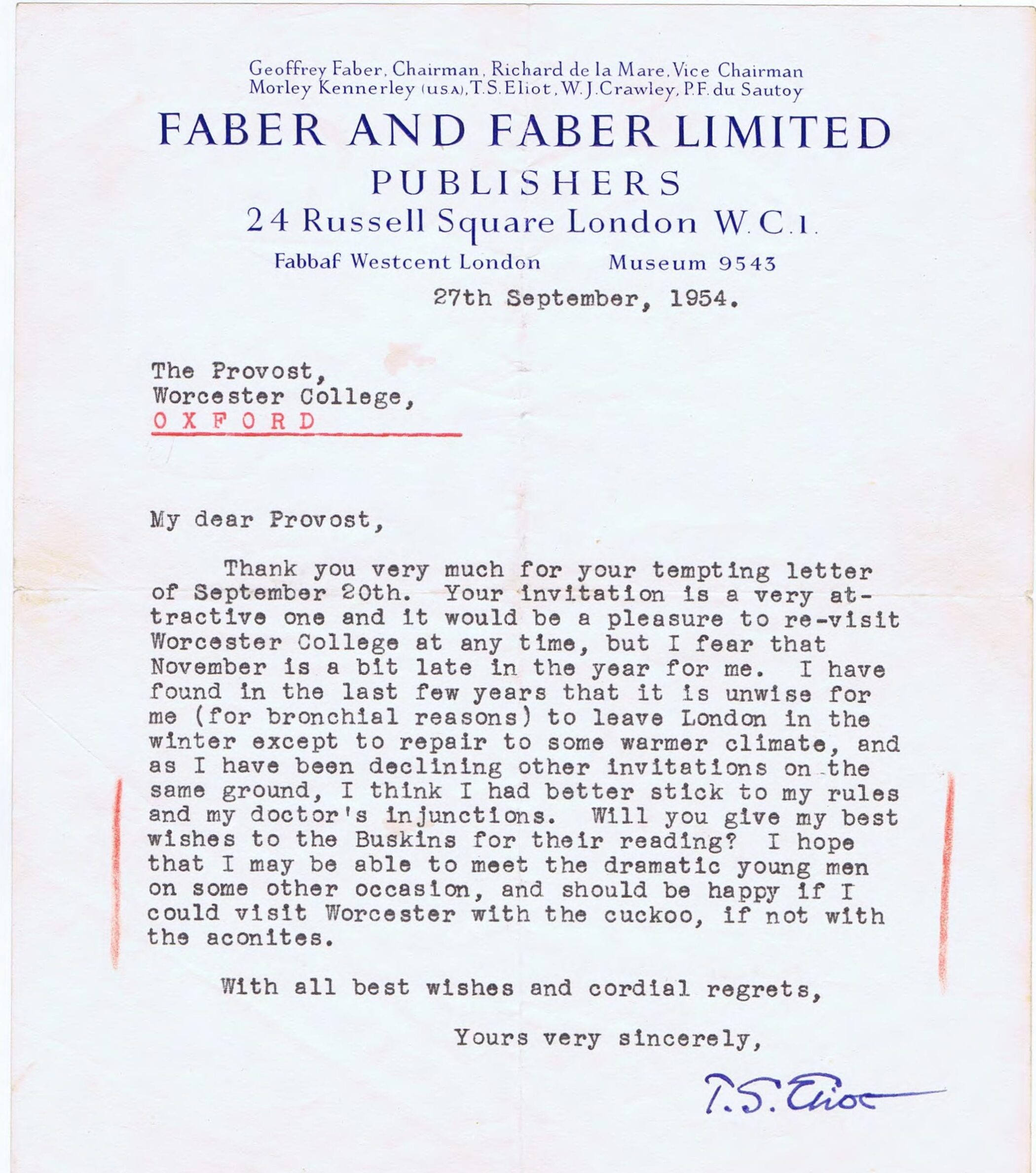
24th April 2020
‘With all best wishes and cordial regrets…’: turning down social invitations
2019/028 Letter from Samuel Beckett, 1967
WOR/JCR 4/2 Letter from T. S. Eliot, 1954
PDR 3/1 Letter from Robert Graves, 1961
Last summer, the College Archives received a donation from an old member: a letter from Samuel Beckett declining to visit in 1967, stating that he “was incapable of giving talks”. It joins two other letters in the Archives where invitations were rejected, and now seems a good time to look at these early adopters of social distancing.
[Unfortunately, I am unable to photograph the letter from Samuel Beckett as I am currently working from home.]
In 2009, shortly after joining Worcester College, I found a letter tucked into a minute book of The Buskins, the College drama society. There is no other surviving correspondence of The Buskins, but this letter had survived where others had not because it had been sent by T. S. Eliot. In 1954, Sir John Masterman, the Provost, had invited Eliot to a dramatic reading by The Buskins of his play The Murder in the Cathedral, about the murder of Thomas Becket. In response, Eliot sent a polite rejection, stating that he was under doctor’s orders not to leave London in the winter “for bronchial reasons”.
As indicated in the letter, T. S. Eliot had previously visited the College, and it may be that the memory of this occasion made him more reluctant to defy his doctor. In 1928, an undergraduate literary society, The Philistines, hosted Eliot for a reading of The Waste Land. The event was organised by the College Chaplain, William Force Stead, who had baptised Eliot into the Church of England the previous summer. Stead later wrote a description of the meeting which perhaps indicates that the Philistines lived up to their name:
“The poem was not widely appreciated at that time and called forth some very foolish remarks…A discussion dragged along for some time until a round-faced youth bounced up and said,
‘Mr Eliot, may I ask a question?’
‘Certainly’
‘Er-did you mean that poem seriously?’
Eliot looked non-plussed for a moment, and then said quietly, ‘Well if you think I did not mean it seriously, I have failed utterly.’”
Another report claims that after a period of silence an undergraduate, with nothing else to add to the discussion, asked Eliot where he had got his pipe.
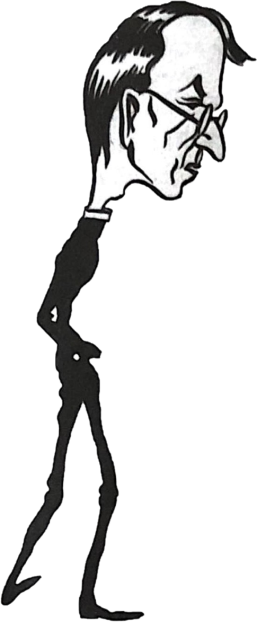
Cartoon of William Force Stead by ‘Ush’: Ralph Usherwood (1911-2000), matriculated at Worcester in 1930.
It seems that no Worcester literary society was truly worthy of the title until they had a prominent letter of regret. The Lovelace Society was named after Richard Lovelace (1617-1657), a Civil War poet and army officer who had been an undergraduate at Gloucester Hall (the institution that preceded Worcester College on the same site). It was they who invited Robert Graves to the College in 1961 to give a talk, just as Graves was beginning his term as the Oxford Professor of Poetry, a position elected by members of Convocation (a group that includes Oxford graduates who have had their degree formally conferred, and members of staff who make up the University’s ‘parliament’, known as Congregation). Professors of Poetry are elected every four years, and are required to give a public lecture once a term and an oration at the honorary degree ceremony each year. The Lovelace Society must have written to Robert Graves shortly after his election but, as can be seen from the letter below, they approached him too early and he turned down the invitation claiming he had “too much work to clear off here”.
The Lovelace Society was sometimes greeted with more positive responses: they hosted J. R. R. Tolkien in 1938, when he read an early version of Farmer Giles of Ham (for more information see our blogpost from February 2016). Unfortunately, I am unable to check their other surviving minute books, currently safely stored in the College Archives, to see if the Society extended invitations to other Professors of Poetry.
Student societies sprang up across Oxford in the late-nineteenth century as a way to pass the time under curfews that saw undergraduates confined to their own college in the evenings. At Worcester they often focused on literature, with members taking it in turns to write essays for discussion, but there were also societies for drama, history, law and dining, in addition to the sports clubs and their social side.
It might seem slightly frivolous to draw parallels with the current world situation in this way. It is, however, a reminder that whereas once things had to happen in person, we are lucky that we can now meet in virtual spaces to continue enjoying the literary and cultural things we share – and to support each other.
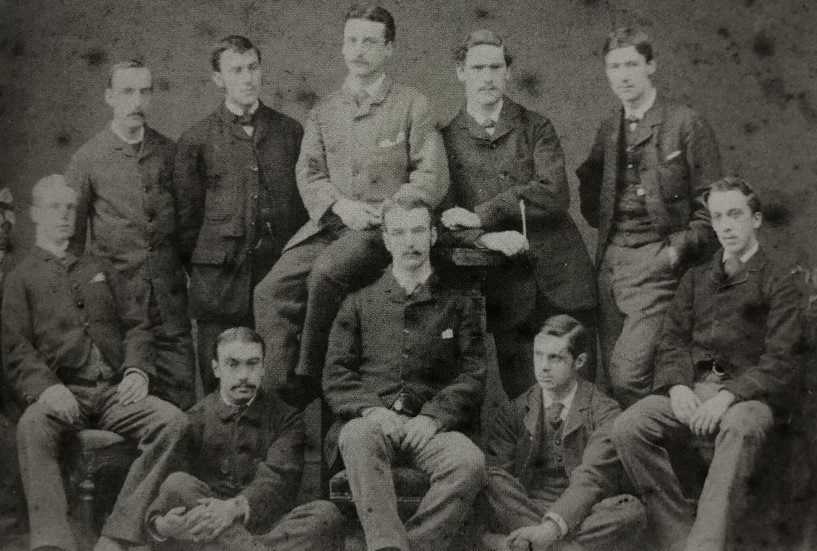
The De Quincey Society in 1880
Emma Goodrum, College Archivist
Bibliography
- David Bradshaw, ‘The American Chaplain and the Modernist Poets: William Force Stead, W. B. Yeats and T. S. Eliot’ in Worcester College Record 2011 at p. 128
- Emma Goodrum, ‘Out of Hours’, in Jonathan Bate and Jessica Goodman, Worcester: Portrait of an Oxford College (2014), pp. 182-9
- ‘Professor of Poetry’ on the website of the University of Oxford, http://www.ox.ac.uk/about/oxford-people/professor-of-poetry









